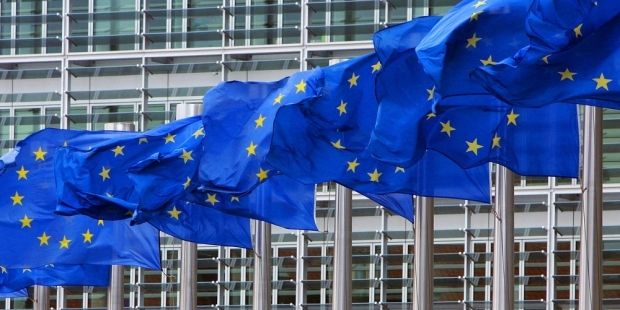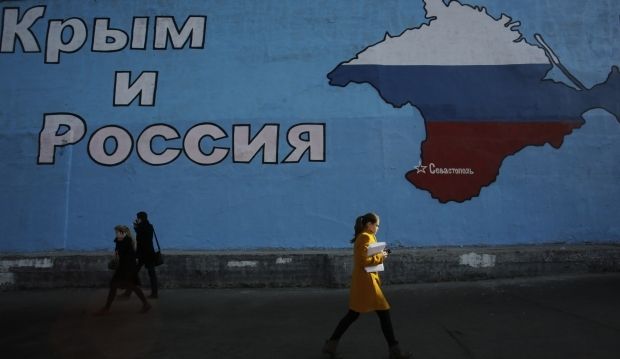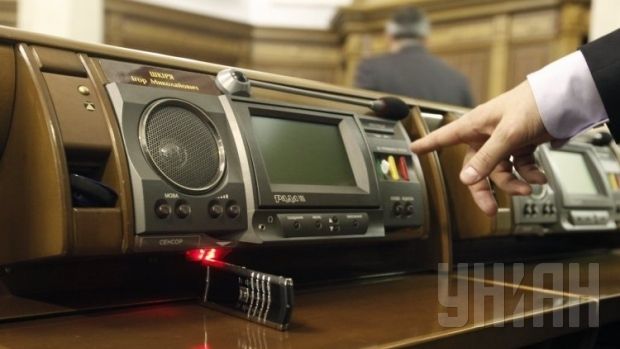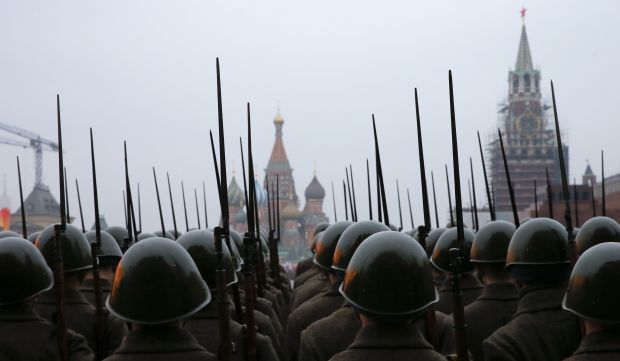
EU no longer a strategic partner for Russia. Ukraine still is, for now…
On June 10, the European Parliament passed a resolution stating that Russia is no longer considered the EU’s strategic partner. Meanwhile, Ukraine still has not scrapped its Treaty on Friendship, Cooperation and Partnership with Russia.
According to the document adopted by the European Parliament, the Russian Federation cannot be considered as a strategic partner of the EU member states after Crimea’s annexation and the continuing escalation of the Donbas conflict. “Russia openly opposes the international democratic community and the rule of law, in particular, trying to redraw Europe’s borders by force,” reads the resolution.
In addition, the European Parliament drew attention to the “atmosphere of hatred directed against opposition activists, human rights activists, minorities and neighboring countries, and the deterioration of the human rights and the rule of law” in Russia, itself.
In this context, MEPs called for “making a critical reassessment of relations with Russia.” For example - suspending cooperation with Russia in the military-technical sphere.
However, the European Parliament believes that, taking into account the political, trade, transport and energy links, and contacts between people, “constructive and predictable relations between the EU and Russia are possible and desirable.” However, they should be based “on respect for international law, and dialogue.”
Statement of fact
By and large, such a resolution of the European Parliament is just a natural recognition of an existing fact. For example, a Lithuanian politician Gablielyus Landsbergis, introducing the resolution, noted the recent Moscow’s “black list”, prohibiting 89 EU citizens entry to Russia. There are 19 members of the European Parliament on that list. Can there be any strategic partnership if Russia forbade them to enter its territory without any explanation?

However, the cooling of relations started long before the annexation of Crimea and the occupation of the Donbas by Russian-terrorist troops. “Since 2008, in particular, during the events in Georgia, the strategic partnership between the EU and Russia has lacked substantive content,” political analyst Vitaly Kulyk told UNIAN.
Still, according to him, with such move Europe actually put an end to the political dialogue on rapprochement with Russia.
In turn, head of the Penta Center for Applied Political Studies Volodymyr Fesenko said that the EP resolution is a yet another negative political signal to the Russian Federation. “The European Union is demonstrating its political opposition to Russia’s current policy,” says the expert.
At the same time, he noted that not all EU member states agree with such decision of the European Parliament.
A partner or an aggressor?
Ukraine, in turn, has not yet cut all strategic cooperation with the aggressor state. "Why have the Europeans – nearly 30 countries – made this decision after Russia’s hostile actions against Ukraine, while Ukraine has failed to scrap strategic agreements and suspend the activities of intergovernmental committees in the wake of an ongoing war?” wonders the former Consul General in Edinburgh and Istanbul, the head of the Board of the “Maidan of Foreign Affairs” Foundation Bohdan Yaremenko.
In his opinion, the actions of the European Parliament is a vivid example for Ukraine. Breaking the strategic partnership with Russia would be the only correct and logical decision in a situation where Ukraine faces armed aggression.
The diplomat noted that previous attempts to denounce the agreement on Ukraine’s strategic partnership with Russia collapsed at the early stages of discussion. Our top political leaders are afraid of the political responsibility for their actions and are apparently wary of any economic sanctions against their assets. I think these are the reasons that prevent Ukraine to make timed and appropriate decisions in response to the aggression,” Yaremenko said.

Vitaly Kulyk shares the same opinion, “Kyiv is afraid of a hard talk with Russia. Ukraine has always been late with such decisions. The executive branch and the MPs have adopted them only under the immense pressure from the active part of the civil society, like it was in the case with recognizing Russia as an aggressor state. In addition, civil society and experts raised the question of preventing Russian citizens from taking part in the OSCE monitoring mission, while our Foreign Minister avoided this issue and tried not to raise it in any way. As a result, this issue is now on the agenda only due to the pressure from the expert community.”
Political apathy
Despite the fact that the National Security Strategy, recently approved by the President of Ukraine, no longer provides for a strategic partnership with Russia, Ukraine still has to make similar amendments to a number of other agreements, given that the formula of the Ukrainian-Russian strategic partnership has long since lost all sense whatsoever.
Experts point out that provisions of the international documents that recognize the Russian Federation as Ukraine’s strategic partner are still operating today. In particular, this refers to the Treaty of Friendship, Cooperation and Partnership of 1997, in which Ukraine and Russia are defined as “friendly, equal and sovereign states” that build their relations on mutual respect and trust, strategic partnership and cooperation.
However, according to Fesenko, it is important that in this document Russia recognizes the territorial integrity of Ukraine. “In particular, we are talking about the fact that in this treaty Russia recognized Crimea as a part of Ukraine. This part of the agreement outweighs everything else,” he said.
According to the analyst, it is impossible to abolish just a part of the agreement, while upholding the other part. Therefore, it is necessary to leave the treaty in its existing form, as Russia agrees in it that Crimea is a part of Ukraine. However, unfortunately, it still does not provide any guarantees for the return of the annexed peninsula back under Ukrainian jurisdiction. After all, Moscow admits its obligations only when it sees its own benefits.

By the way, it is also understood in the European Parliament, as the resolution states that in the long term, due to a lack of trust in Russia, the resumption of cooperation must be based on Moscow’s fulfillment of several conditions. Among them, in particular, is the change in Russia's policy towards Ukraine. This means, firstly, the full and unconditional fulfillment of the Minsk Agreement. Secondly, the return of Crimea to Ukraine, thus restoring the status quo and control of the Ukrainian government over the state’s territory within its internationally recognized borders.
Between economic expediency and common sense
Anyway, Ukraine has only scrapped a number of agreements with Russia in the field of military-technical cooperation. “I understand that not everything can be stopped simultaneously, there are some procedural and legal aspects, but the process has been launched,” said Fesenko.
According to him, the criticism of the Ukrainian authorities on the ongoing trade and economic relations with the Russian Federation does make some sense. However, having imposed sanctions, the EU has not completely halted its trade with Russia. “We cannot completely stop trade with Russia, despite the war, because, unfortunately, we are very dependent on the Russian Federation. If we stop this trade, then we’ll punch the liver of our economy. Still, there is curtailment of relations with Russia, albeit a slow one,” said the expert.
However, co-director of foreign policy and international security programs at the Razumkov Center Oleksiy Miller with strongly disagrees. “Any talk that [the termination of the strategic partnership – UNIAN] may cause some consequences is irresponsible,” he said.
According to the expert, in a state of war with the aggressor state, one cannot search for arguments to continue calling Russia a partner. “Despite the fact that there is indeed a critical dependence on the supply of certain spare parts and components, we can’t prolong the agony... For example, providing the transit of gas through its territory to European consumers, Ukraine should take a firm stance and give up Russian gas, at least until the end of the aggression. It is also necessary to continue to curtail cooperation in space, aviation and construction industries ... Failure to take such decisions will provoke worse consequences in the future,” said Miller.
Moreover, the failing to make such decisions undermines Ukraine’s credibility in the West. “The most obvious example is the continuation of trade with Crimea, which we have recognized the occupied territory and where Ukraine demands from all its international partners to impose sanctions, while continuing trading operations,” he said.
In general, experts agree that the Ukrainian authorities should make a firm decision on the relations with the aggressor state, while avoiding any loud statements, especially given that their practical steps do not match those words.
Kostyantyn Honcharov

